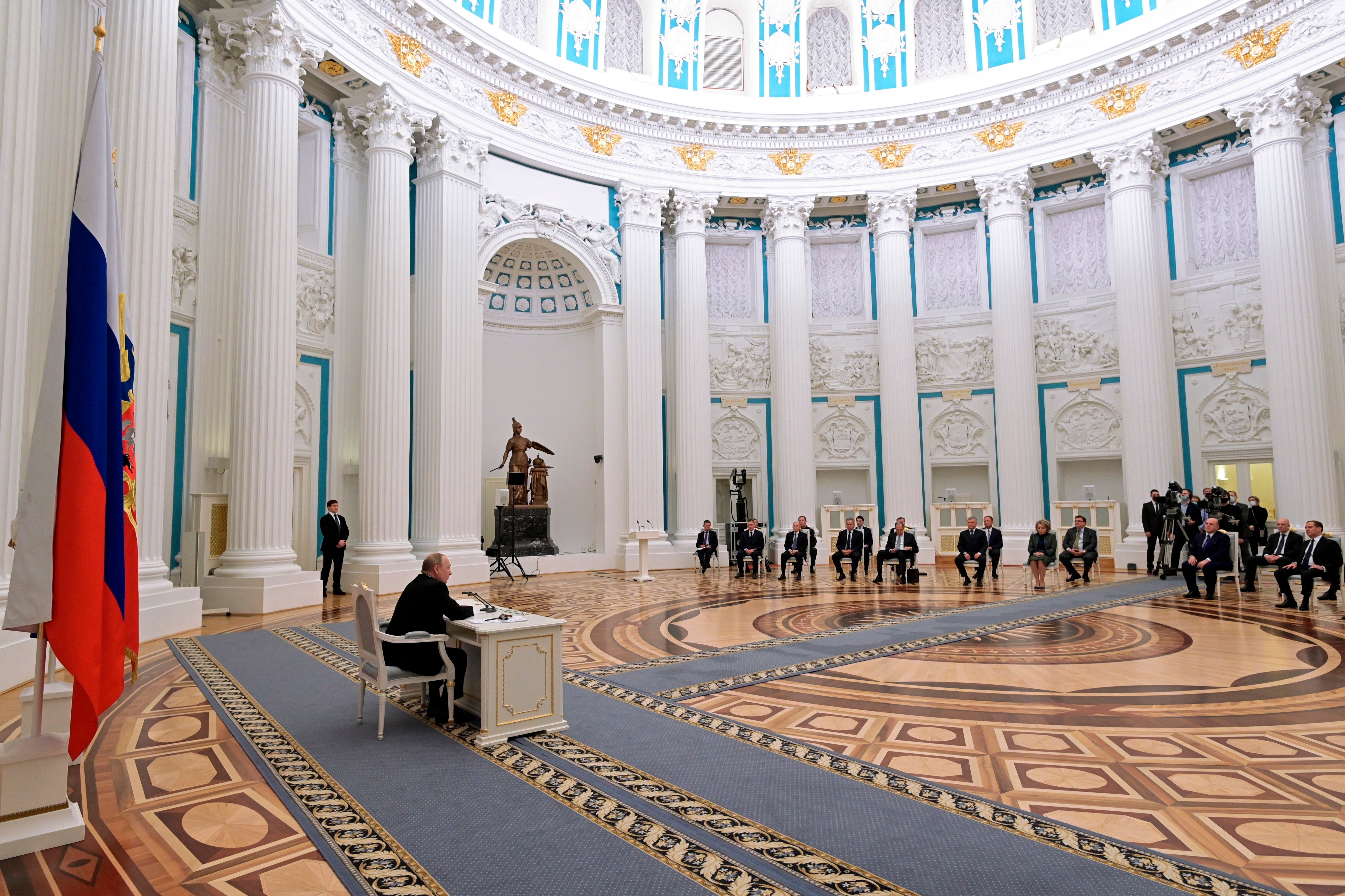Ukraine-Russia crisis: What to know in the escalating crisis
Leaders around the world have condemned Russian President Vladimir Putin and prepared to hit his administration with sanctions after he sparked fears of war with new legislation that would allow the deployment of troops to rebel-held regions of eastern Ukraine

World leaders condemned Russian President Vladimir Putin and prepared Tuesday to hit his administration with sanctions as he heightened fears of war with legislation that would allow the deployment of troops to rebel-held regions of eastern Ukraine.
From a hastily convened meeting of the United Nations Security Council to capitals around the world, leaders condemned Putin's recognition of the two pro-Russia regions and order to send troops there. They warned of global fallout from a conflict in Ukraine.
A vaguely worded decree signed by Putin late Monday did not say if Russian troops were on the move, and it cast his order as an effort to “maintain peace.” Lawmakers in the Kremlin-controlled parliament are likely to rubber-stamp legislation authorizing the use of troops in in the separatist regions, an area known as Donbas.
Ukrainian President Volodymyr Zelenskyy sought to project calm, telling the country in an address overnight: “We are not afraid of anyone or anything.”
The U.S. ambassador to the United Nations dismissed as “nonsense” Putin’s statement that Russian troops would be acting as peacekeepers, saying their presence is “clearly the basis for Russia’s attempt to create a pretext for a further invasion of Ukraine.”
The White House issued an executive order Monday to prohibit U.S. investment and trade in the separatist regions. Additional measures — likely sanctions — were to be announced Tuesday by the U.S., the U.K. and the European Union.
Here is a look at the latest developments in the security crisis in Eastern Europe:
WHAT'S HAPPENING IN EASTERN UKRAINE?
Convoys of armored vehicles were seen rolling across the separatist-controlled territories late Monday. It wasn’t immediately clear if they were Russian.
Russian officials haven’t yet acknowledged any troop deployments to the rebel east, but Vladislav Brig, a member of the separatist local council in Donetsk, told reporters that Russian troops already had moved in, taking up positions in the region’s north and west.
The legislation expected to quickly sail through both houses of Russia's parliament Tuesday envisage military ties, including the possible establishment of Russian military bases in the separatist regions.
British Prime Minister Boris Johnson said that “all the evidence is that President Putin is indeed bent on a full-scale invasion of the Ukraine, the overrunning, the subjugation of an independent, sovereign European country and I think, let’s be absolutely clear, that would be absolutely catastrophic.”
___
IS THERE STILL ROOM FOR DIPLOMACY?
With an estimated 150,000 Russian troops massed on three sides of Ukraine, the U.S. warned Friday that Putin had already decided to invade. Still, President Joe Biden and Putin tentatively agreed to a meeting brokered by French President Emmanuel Macron in a last-ditch effort to avoid war.
Kremlin spokesman Dmitry Peskov, though, said “it’s premature to talk about specific plans for a summit.”
Ukraine’s United Nations ambassador, Sergiy Kyslytsya, said during a Monday night Security Council meeting: “We are committed to a political diplomatic settlement and do not succumb to provocations.”
___
WHAT IS THE EU DOING?
European Union foreign ministers are set to meet Tuesday to decide on what sanctions to impose over Russia’s decision to recognize the two separatist regions, the 27-nation bloc’s top diplomat said.
EU foreign policy chief Josep Borrell said the aim is not to impose the whole range of sanctions the EU has prepared should Russian invade Ukraine, but rather to address the recognition of Donetsk and Luhansk as independent.
French Foreign Minister Jean-Yves Le Drian was clear about the goal of the meeting in Paris.
“Obviously, we will take the initiative to impose sanctions” he said.
The United Kingdom, while no longer part of the EU, will follow suit.
Johnson said the U.K. would introduce “immediate” economic sanctions against Russia. He said the sanctions would target “Russian economic interests as hard as we can” and told broadcasters the package would be “just the first barrage of U.K. economic sanctions against Russia."
___
WHAT HAPPENED AT THE UN SECURITY COUNCIL?
UNITED NATIONS -- Ukraine’s U.N. ambassador demanded that Russia cancel its recognition of the independence of the separatist regions in the east, immediately withdraw its “occupation troops” and return to negotiations.
Sergiy Kyslytsya said during Monday night's emergency meeting of the U.N. Security Council on Monday that Ukraine called the rare evening session to protest and condemn Putin’s “illegal and illegitimate” decision to recognize the separatist-controlled regions.
Kyslytsya said Ukraine's internationally recognized borders "have been and will remain unchangeable regardless of any statements and actions by the Russian Federation.”
He said Putin's moves “may be considered” as Russia’s unilateral withdrawal from the Minsk Agreements, which were aimed at restoring peace to eastern Ukraine, and its disregard of the Normandy format comprising Russia, Ukraine, France and Germany which has tried to resolve the eight-year war in the east.
Linda Thomas-Greenfield, the U.S. ambassador to the United Nations, dismissed “as nonsense” Putin’s assertion that Russian troops would be in Donbas as peacekeepers. She said he gave the world a choice, and it “must not look away” because “history tells us that looking the other way in the face of such hostility will be a far more costly path.”
___
AP writers around the world contributed to this report.
___
Follow AP's coverage of the tensions between Russia and Ukraine at https://apnews.com/hub/russia-ukraine
Bookmark popover
Removed from bookmarks